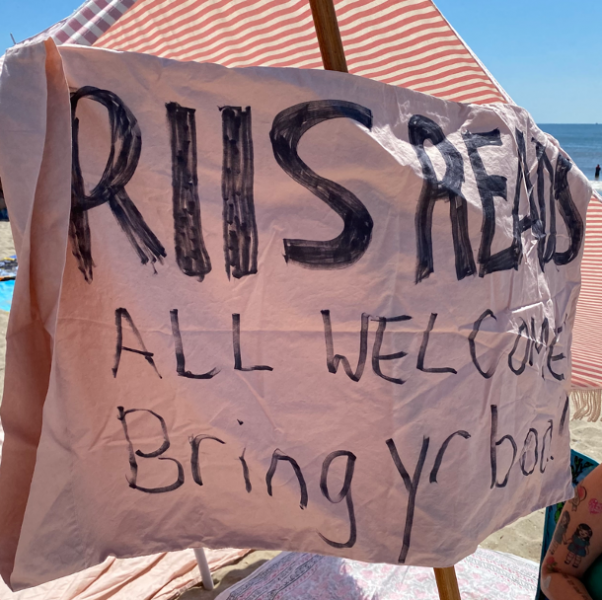- Categories:
Building Community And Resistance Through Read-Ins With K. Kerimian, The Nonbinarian Book Bike

This article is an excerpt from The ABA Right to Read Toolkit: How Booksellers and Readers Can Resist Book Bans. Check out the full Toolkit on BookWeb!
The People’s Beach at Jacob Riis Park in Queens, NY, better known to its regulars as The Queer Beach. Signs painted on pillowcases reading “RIIS READS. ALL WELCOME. Bring yrbook.” A “reading nook” made of tents and towels, like something out of a slumber party. And dozens of queer readers, in various states of beachwear, reading the kinds of books — queer, trans, intersectional — that are being banned in droves around the country.
The scene is a typical one for “Riis Reads”, a monthly read-in series that began meeting in the summer of 2023. It began when K. Kerimian (they/them), founder of The Nonbinarian Book Bike, was at Riis with friends and noticed the preponderance of readers at the beach. A friend said they wished they could document it, but they weren’t comfortable approaching people to ask what they were reading. Kerimian, energetic and a self-described “cartoon,” responded, “I do feel comfortable! C’mon, gang!” and waded into the crowd.
Kerimian’s instincts are to build community. A bookseller at Greenlight Bookstore, they founded the Nonbinarian Book Bike in 2023 to expand access to queer books to those who might not otherwise be able to find them. The bike’s front is a bright pink box that unfolds into a book display full of donated LGBTQ+ books. Most weekends, Kerimian can be found posted in various parks around Brooklyn, calling, “Free Books! They’re gay!” (Very occasionally, they are joined by their dog, C.K. Dexter Haven.)
Riis Reads came out of the community created by the book bike, but it wasn’t exactly planned. By the time they reached the water that day at Riis, Kerimian had collected an Instagram carousel’s worth of pictures, dozens of conversations with readers, and who knew how many book suggestions. Somewhere along the way, Liysa, a new friend, suggested making an event called “Riis Reads.” The seeds of the read-in series had been planted in the sand.

Soon after deciding to make the event happen, Kerimian reached out to Fayola Fair at Reading for Black Lives, which distributes free BIPOC books, and Amelia Goodman of Bookworm, a reading-tracking app. A couple of hours in a group-chat later, it was organized.
To most people, Riis Reads probably doesn’t look like a read-in, and may not even look like activism. But the combination of the task, the location, and the community make it exactly that. “It’s so 43 interesting to think what a read-in sounds like and what it might be,” says Kerimian. “You envision it set at a summit or your local politician’s office, and that is its history as a political act. This inadvertently became that, but more out of queer community and joy than anger.”
It couldn’t happen anywhere but the Queer Beach. “It is a landmark queer site in New York that goes back far enough that it feels like you’re walking on a little piece of history. Not history that is of the past and is gone, like Stonewall sometimes feels — like visiting a ghost of history. It feels like contributing to a future history.”
The site is also a rite of passage for queer New Yorkers, a place of discovering oneself and community. For Kerimian, these acts are themselves ones of resistance. “Being queer is inherently political. And I think that’s part of everyone’s journey, whatever that means to them. Whatever level of engagement in self-study it entails. We’re not taught our history in the classroom, so we have to self-educate. It doesn’t feel like homework. It feels like unlocking something inside yourself.”
Riis Reads invites bookish queer folks to do just that, and to do it while building community. It is as welcoming as possible, establishing clear signals for those who do and do not want to be engaged. They ask everyone to ask for consent before approaching someone. But they invite readers to come alone or with friends, however they are able and comfortable.
The future of Riis Reads looks encouraging. The series plans to come back in 2024. Meanwhile, Kerimian doesn’t mind thinking bigger. “I’d love for it to be an organized National Day where people go and do this. And the point would be awareness. The point would be an act of rebellion.”

